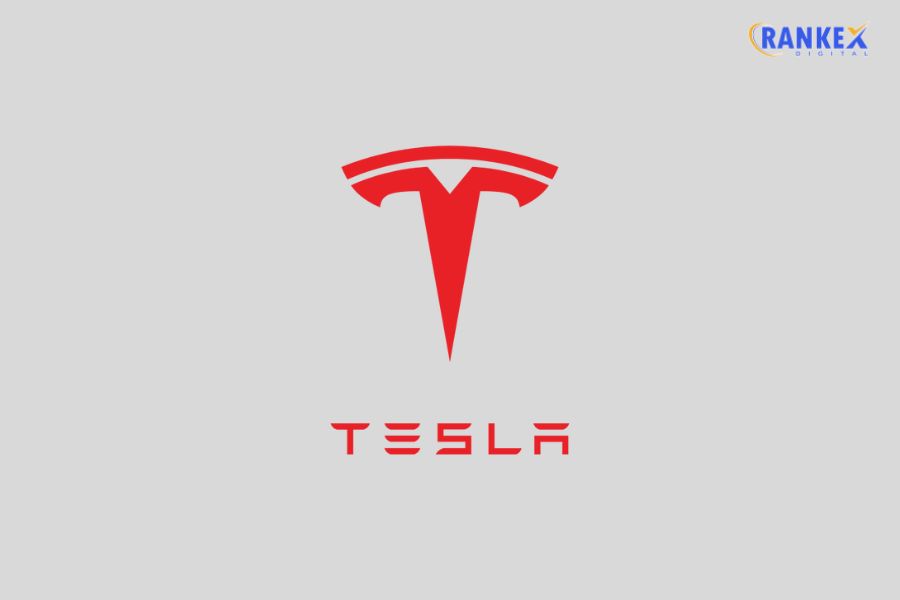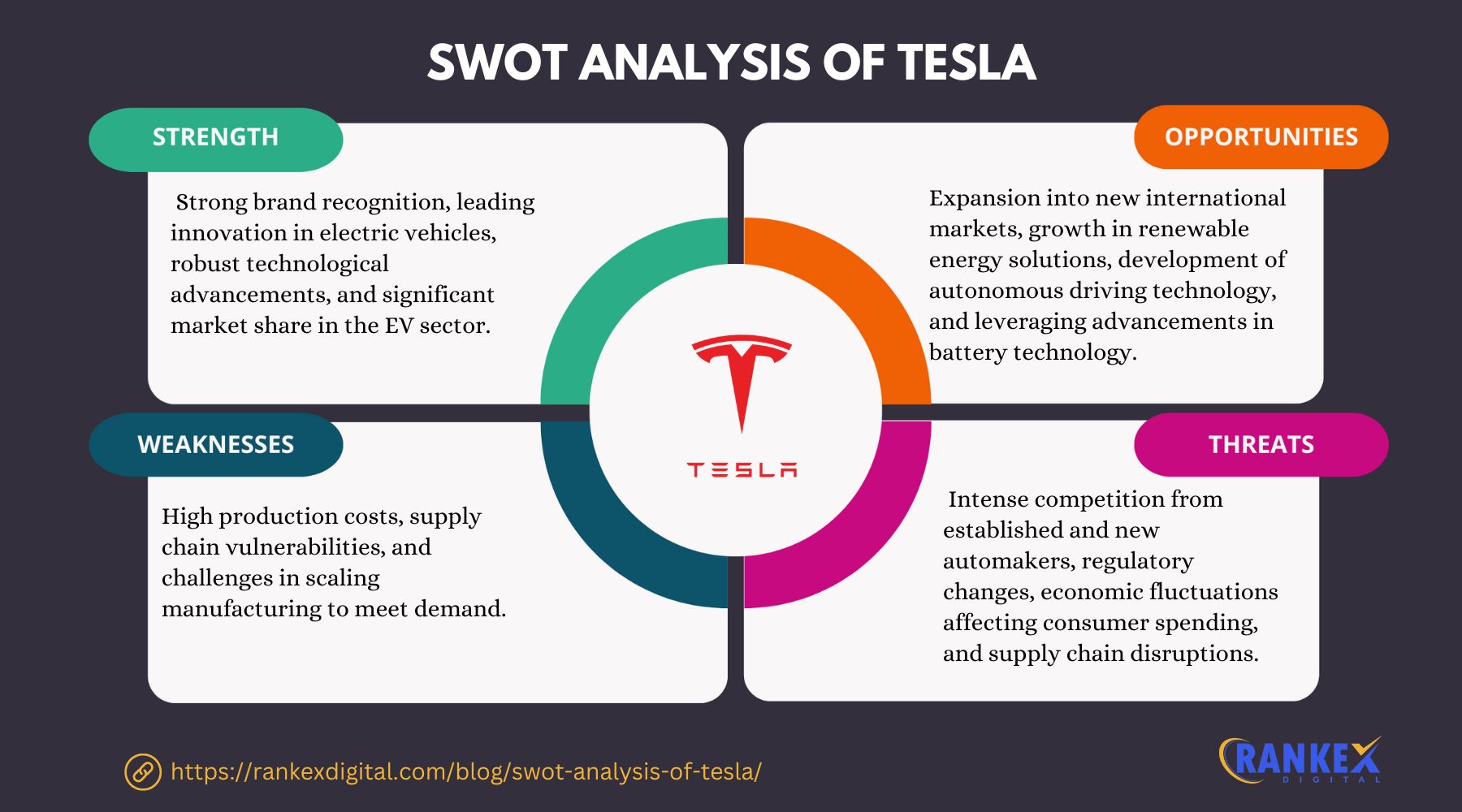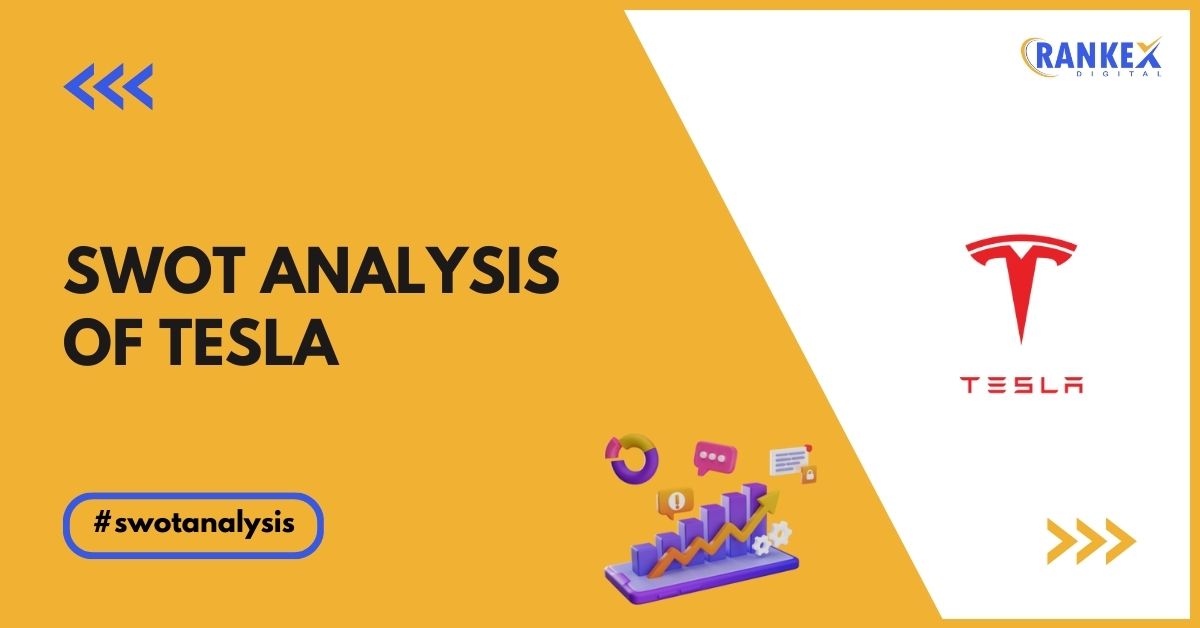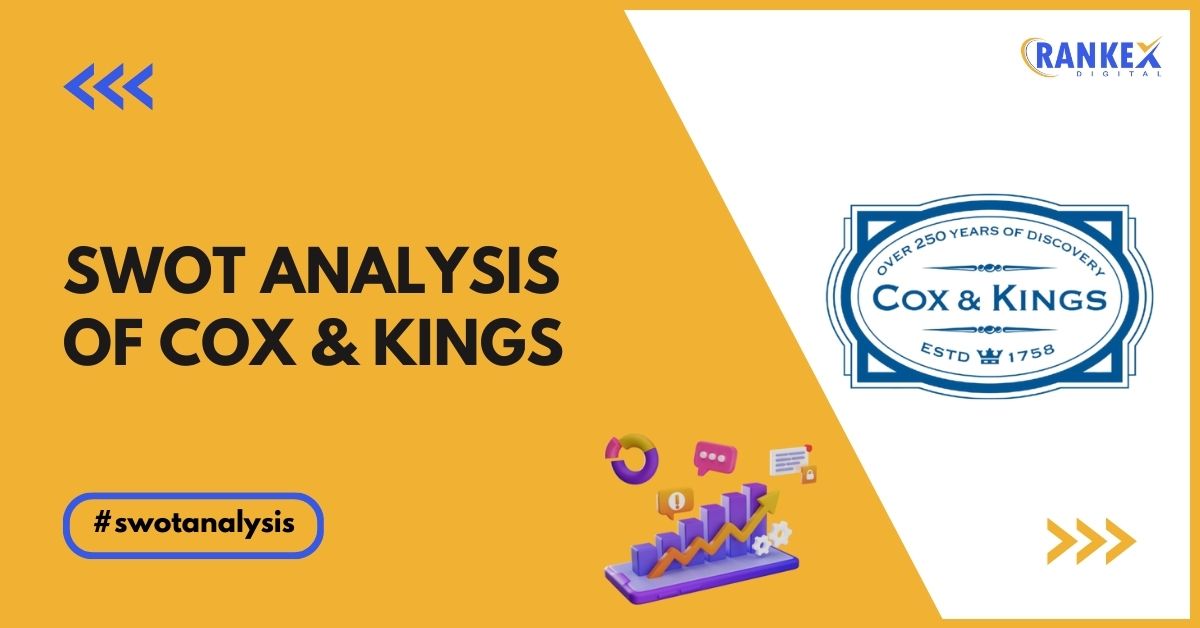Tesla, Inc., founded by Elon Musk, is a global leader in electric vehicles (EVs) and renewable energy solutions. With its cutting-edge technology, sustainable practices, and focus on renewable energy solutions, the company has revolutionized the automobile industry.
In 2024, Tesla remains a dominant force in the global EV market, while continuing to innovate in energy storage, solar power, and autonomous driving technology. This SWOT analysis of Tesla delves into Tesla’s strengths, weaknesses, opportunities, and threats in 2024.
In this blog
Overview of Tesla

| Founder | Elon Musk (Co-founder) |
|---|---|
| Year Founded | 2003 |
| Origin | California, USA |
| Industry | Automotive, Energy |
| Annual Revenue | $100+ Billion (FY 2023) |
| Employees | 125,000+ |
Tesla is primarily known for its electric vehicles (such as the Model S, 3, X, and Y), as well as its involvement in renewable energy through solar products and energy storage solutions like Powerwall and Powerpack.
Current News on the Market on Tesla
- Expansion into Global Markets: Tesla is aggressively expanding its presence in emerging markets like India, Southeast Asia, and South America, aiming to capture a significant share of the global EV market.
- Autonomous Driving Advancements: Tesla continues to make progress on its Full Self-Driving (FSD) technology, with frequent updates and testing to refine the system.
- Sustainability Initiatives: Tesla has further committed to reducing carbon emissions, not only through its EVs but also by expanding its solar energy and battery storage solutions.
- New Product Launches: Tesla is set to launch the highly anticipated Cybertruck and Tesla Semi in 2024, both of which are expected to disrupt their respective markets.
- Stock Market Performance: Tesla remains one of the most valuable companies globally, with its stock continuing to perform strongly, driven by solid demand for EVs and renewable energy products.
SWOT Analysis of Tesla

Strengths of Tesla
- Innovation Leader in EV and Renewable Energy
Tesla is a pioneer in electric vehicles and renewable energy, setting industry standards for innovation and sustainability. Its continued investment in battery technology, autonomous driving, and energy storage systems keeps it ahead of competitors. - Strong Brand and Global Recognition
Tesla is one of the most recognizable brands worldwide, synonymous with luxury, technology, and sustainability. Its premium brand image has helped the company attract a loyal customer base across global markets. - Vertically Integrated Business Model
Tesla’s vertical integration allows it to control every aspect of its supply chain, from manufacturing batteries and vehicle components to selling directly to consumers. This reduces costs and ensures quality control across its products. - Growing International Footprint
Tesla’s expansion into Europe and Asia, particularly through its Gigafactories in Berlin and Shanghai, has strengthened its position in the global EV market. These plants enable Tesla to cater to local demand while reducing transportation costs. - Dominance in Battery Technology
Tesla’s expertise in battery production and energy storage gives it a significant competitive edge. Its Gigafactories produce large volumes of batteries for its vehicles and energy storage products, enabling Tesla to meet the growing demand for clean energy solutions.
Weaknesses of Tesla
- High Vehicle Prices
Tesla’s vehicles are positioned in the premium market, making them less accessible to middle-income consumers. Their high price point may limit their market share in cost-sensitive regions, particularly emerging markets. - Production Delays and Supply Chain Issues
Tesla has faced frequent production delays and challenges in scaling its manufacturing capabilities, particularly for new products like the Cybertruck and Tesla Semi. These delays can result in customer dissatisfaction and lost sales opportunities. - Overdependence on the U.S. Market
A significant portion of Tesla’s revenue comes from the United States, making the company vulnerable to changes in U.S. economic conditions, regulations, and consumer demand. While Tesla has expanded internationally, it remains heavily reliant on its domestic market. - Quality Control Issues
Tesla has faced criticisms regarding its vehicles’ build quality and reliability, including reports of manufacturing defects and software malfunctions. These issues have led to recalls and can tarnish the company’s premium brand image. - Limited Product Range
Compared to traditional automakers, Tesla’s vehicle lineup is relatively small, consisting of four core models (S, 3, X, Y). This limits Tesla’s ability to cater to diverse customer preferences and compete with automakers that offer a broader range of vehicle types.
Opportunities for Tesla
- Expansion in Emerging Markets
Tesla has significant growth potential in emerging markets, particularly in countries like India and Southeast Asia, where the demand for electric vehicles is rising due to government incentives and increased environmental awareness. - Advancements in Autonomous Driving
Tesla’s ongoing development of Full Self-Driving (FSD) technology positions the company to capitalize on the future of autonomous transportation. As regulatory approval progresses, Tesla could become a leader in this space, offering self-driving taxis and other mobility solutions. - Increasing Demand for Renewable Energy Solutions
As governments and businesses prioritize sustainability, the demand for Tesla’s solar products and energy storage solutions is expected to rise. The company can further expand its renewable energy business by catering to residential, commercial, and industrial customers. - Launch of New Models and Products
The introduction of the Cybertruck, Tesla Semi, and Roadster in 2024 presents significant opportunities for Tesla to expand into new market segments, including electric trucks and commercial vehicles. - Battery Technology and Energy Storage
Tesla can continue to innovate in battery technology, improving the efficiency and affordability of its products. Additionally, the demand for grid-scale energy storage solutions presents a lucrative opportunity for Tesla’s Powerwall and Powerpack products.
Threats to Tesla
- Intensifying Competition in the EV Market
As the EV market grows, Tesla faces increasing competition from traditional automakers like Volkswagen, General Motors, and Ford, as well as new players like Rivian and Lucid Motors. These competitors are rapidly developing electric vehicles to challenge Tesla’s market dominance. - Regulatory Challenges
Tesla’s autonomous driving technology faces regulatory hurdles in many regions, which could delay the widespread adoption of its Full Self-Driving (FSD) feature. Additionally, changes in government policies regarding EV subsidies and renewable energy incentives could impact Tesla’s growth. - Supply Chain Disruptions
Global supply chain disruptions, whether due to geopolitical tensions, pandemics, or natural disasters, can affect Tesla’s ability to source raw materials like lithium and cobalt for its batteries. These disruptions can lead to production delays and increased costs. - Economic Slowdowns and Inflation
Economic downturns or inflationary pressures could reduce consumer spending on premium electric vehicles. Tesla’s high-end product pricing may make it vulnerable to shifts in consumer demand during times of economic uncertainty. - Technology-Related Risks
As Tesla pushes the boundaries of autonomous driving and AI technology, it faces significant risks related to software reliability and safety. Accidents or malfunctions in its Full Self-Driving system could lead to lawsuits, regulatory scrutiny, and damage to its reputation.
Competitors of Tesla
- Rivian
Rivian is a direct competitor in the EV market, particularly in the electric truck and SUV segments. Rivian’s R1T truck and R1S SUV are gaining attention as viable alternatives to Tesla’s Model X and Cybertruck. - Lucid Motors
Lucid Motors competes with Tesla in the luxury electric vehicle space, with its Lucid Air sedan offering advanced technology, performance, and range comparable to Tesla’s Model S. - Volkswagen
Volkswagen is rapidly expanding its EV lineup, with models like the ID.4 and ID. Buzz. Volkswagen’s global scale and ability to produce affordable electric vehicles significantly challenge Tesla’s market share. - General Motors (GM)
GM is making aggressive moves in the EV space, with plans to launch a series of electric vehicles under its Chevrolet, GMC, and Cadillac brands. GM’s Ultium battery technology is also poised to compete with Tesla’s battery innovations. - Ford
Ford has entered the EV market with models like the Mustang Mach-E and the all-electric Ford F-150 Lightning, which directly compete with Tesla’s Model Y and Cybertruck. Ford’s strong brand recognition and loyal customer base make it a formidable competitor in the EV space.
Conclusion
Tesla’s position as a global leader in electric vehicles and renewable energy remains strong in 2024, driven by its innovative technology, strong brand recognition, and commitment to sustainability.
However, challenges such as intensifying competition, regulatory hurdles, and supply chain disruptions must be addressed to maintain its dominance.
By continuing to innovate in battery technology, autonomous driving, and renewable energy solutions, Tesla is well-positioned for future growth in the rapidly evolving clean energy and transportation markets.
Frequently Asked Questions
1. What are Tesla’s main strengths?
Tesla’s main strengths include its leadership in innovation, strong global brand recognition, vertical integration, and expertise in battery technology and renewable energy.
2. What are Tesla’s weaknesses?
Tesla’s weaknesses include high vehicle prices, production delays, overdependence on the U.S. market, quality control issues, and a limited product range compared to traditional automakers.
3. What opportunities exist for Tesla in 2024?
Tesla’s key opportunities include expansion into emerging markets, advancements in autonomous driving technology, increasing demand for renewable energy solutions, and the launch of new models like the Cybertruck and Tesla Semi.
4. What are the main threats Tesla faces?
Tesla faces threats from intensifying competition, regulatory challenges, supply chain disruptions, economic slowdowns, and technology-related risks, particularly with its Full Self-Driving (FSD) system.











